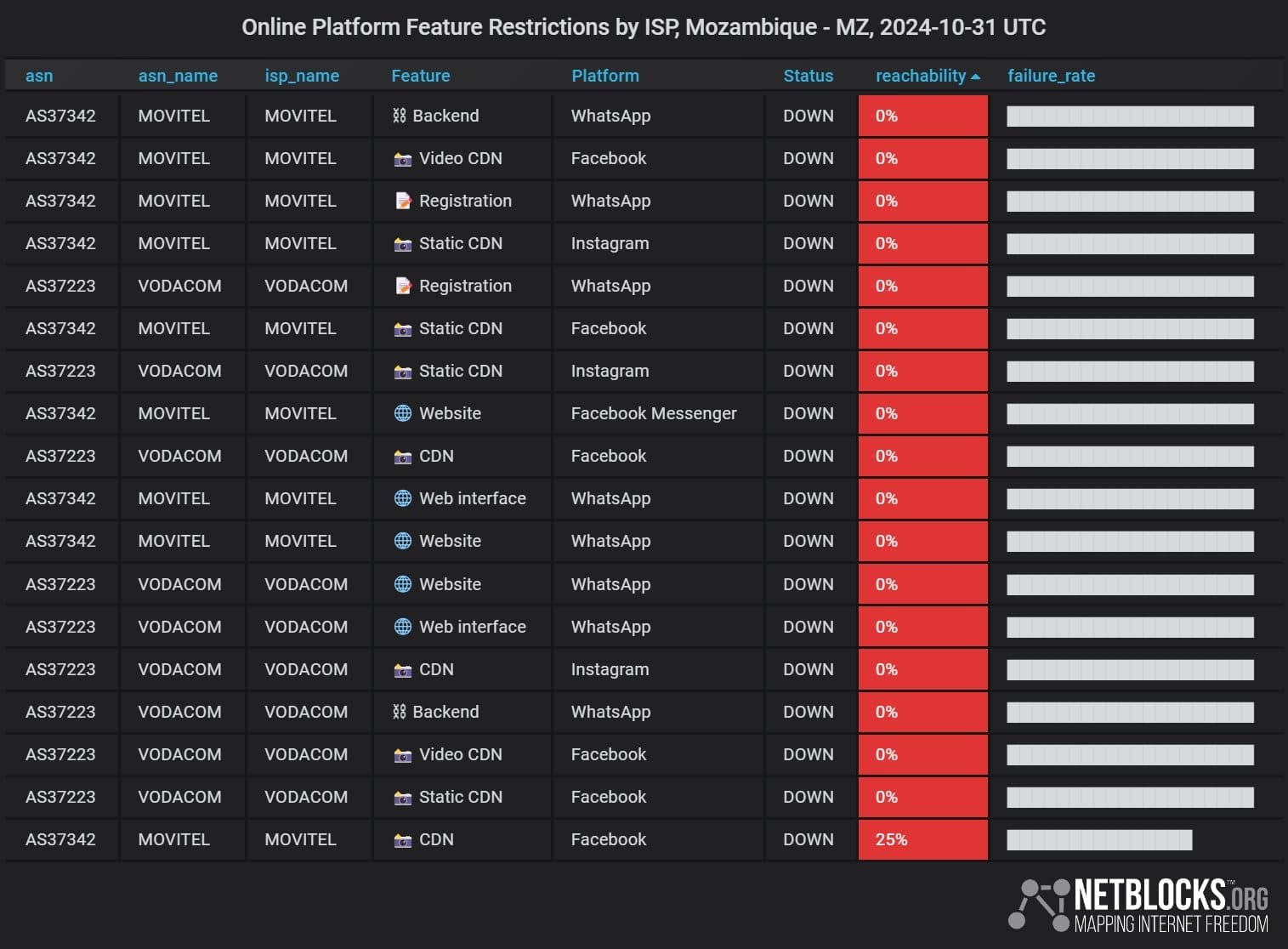- ISPs are blocking internet access in Mozambique amid protests disputing election results that have turned violent.
- As the Frelimo-led government squashes opposition voices, internet access and social media use have been blocked to avoid the platforms being used to organise.
- TMCel, Movitel and Vodacom are allegedly involved in the blocking of the country’s internet access.
It has been a bad start of the month for internet access in African countries having elections. The latest sees country-wide internet blockages in Mozambique as protests disputing the recent election outcome turn bloody.
With more than 21 people, including one police officer, have been killed during violent protests in the country following disputed elections, according to Amnesty International, internet rights watchdog NetBlocks says that Mozambique is experiencing “curfew-style mobile internet blackouts.”
It has been experiencing these blackouts since Monday, and now three days in Netblocks claims it has found evidence that aside from the internet being cut during daytime hours, access to social media sites is also being throttled.
The blackouts seem to be focused during the evening from around 18:00 to around 05:00, potentially in a bid to limit communication but not hinder economic activity or tourism.
Daily Maverick is alleging that the country’s three biggest telecom firms are executing these blackouts, following along with the government’s plan to stifle free speech and any potential organisation of protestors. These three telecoms are TMCel, Movitel. and Vodacom.
Netblocks’ own metrics are confirming the same, with Vodacom and Movitel the main ISPs involved in the blocking of messaging platforms like Facebook Messenger, WhatsApp and Instagram.

The role of messaging platforms to organise and instigate protest action was no more exemplified than during the 2011 Egyptian revolution that saw the regime of Hosni Mubarak, marked by police brutality, removed from power. It was reported that protestors used Facebook to organise key mobilisations that spurred the revolution.
In June, the Kenyan government attempted a similar internet blackout as protestors flooded into Nairobi’s streets against incoming widespread tax hikes and deadly force by officials.
Safaricom, owned by Vodacom parent Vodafone, was implicated in being behind the blackout, though officially it said that the internet downage experienced was due to an issue with undersea cables despite no other African ISP seemingly being affected.
“We have experienced an outage on two of our undersea cables that deliver internet traffic in and out of the country. We have activated redundancy measures to minimise service interruption and keep you connected as we await the full restoration of the cables,” it said in a statement at the time.
Gen-Z protestors in Kenya relied heavily on their smartphones and social media, especially TikTok to organise from the grassroots. Protestors livestreamed clashes with the police in order to have international communities hear their plight.
Late last week, Mauritius decided to block access to most social media sites ahead of its own 10th November elections amid a government wire-tapping scandal, however, it quickly backtracked on the ban after 24 hours citing “consultation with relevant authorities.”
A lobby of 1 200 of the island nation’s private companies said they were concerned about the social media interruption saying “Several sectors and activities are already directly and visibly affected, including the tourism sector, call centres, ecommerce operations, education and training, marketing, influencers and any other activity related to the digital economy.”
The intermittent internet blackout in Mozambique is just another example of an African government seeking to squash protest action by removing organisation media.
Technology has a way of opening doors, however, and TechRadar reports that VPN usage in the Southern African nation has spiked enormously with Proton VPN alone seeing a blistering 127 830 percent usage increase in the country.
We have reached out to Vodacom South Africa for comment about its alleged role in Mozambique’s internet blackouts.

